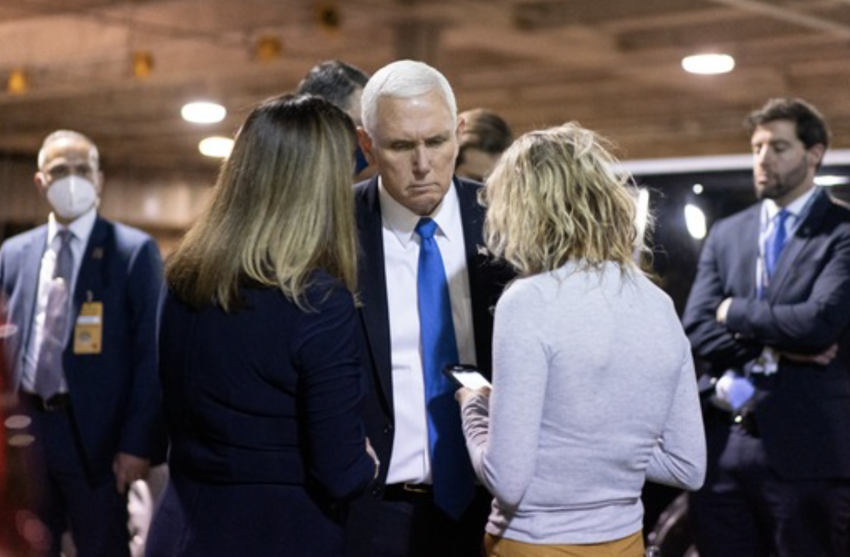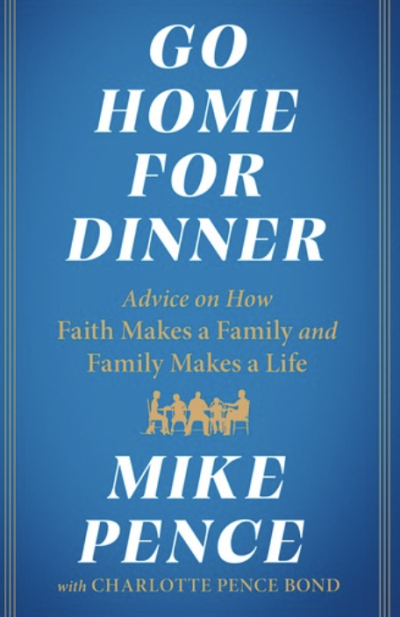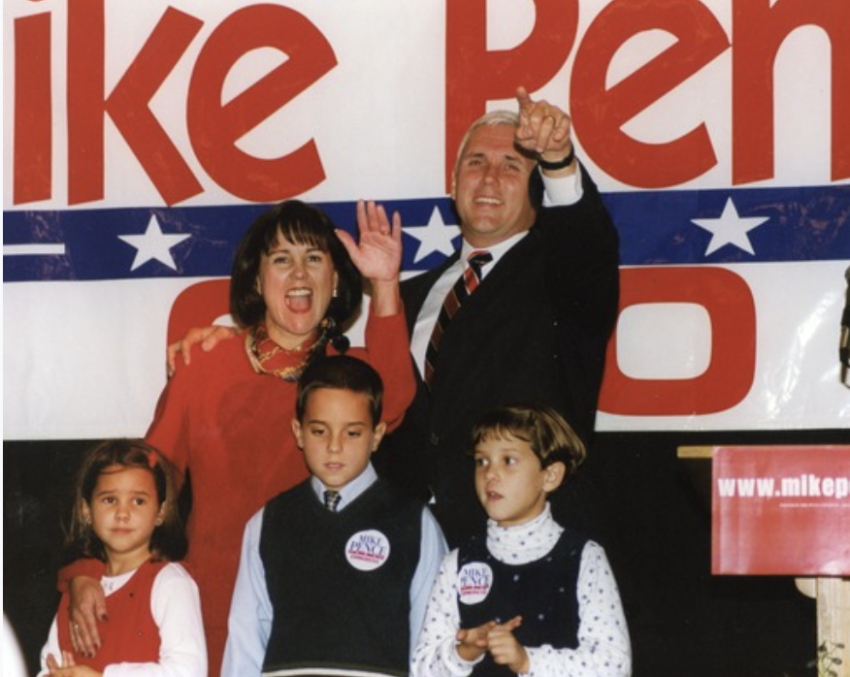Mike Pence on prioritizing family over politics, the 'Billy Graham Rule' and what's next

Throughout his career, from serving as governor of Indiana to vice president of the United States, Mike Pence has led with a simple yet profound truth: the prioritization of the family, in tandem with faith, will lead to a richer, more fulfilling life and a stronger nation.
“The wellspring of our nation's strength has always been the faith of the American people and American families,” the 64-year-old told The Christian Post. “And when our faith is strong, when our families are strong, America is strong.”
And in an era where professional demands often overshadow personal time and loneliness is an "epidemic," Pence is advocating for a return to the dinner table in his new book, Go Home for Dinner: Advice on How Faith Makes a Family and Family Makes a Life, co-authored with his daughter, Charlotte Pence Bond.
For the former vice president, the book, which follows his autobiography So Help Me God, is not just a memoir but a testament to the balance he has strived for between public service and private life — a balance he's quick to stress wouldn't be possible without biblical principles and wise practices.
Pence shared how, during his political ascent, from Congress to the governorship of Indiana, and finally to the vice presidency, he often faced the question, "Where do you see yourself in five years?"

His consistent reply, "Home for dinner," wasn't just a clever retort but a principle he lived by; he made a commitment to be home, every night, with his wife, Karen, and their three children.
Despite the intensity of political life, he maintained that the dinner table was where his family's bond was nurtured, echoing Ronald Reagan's sentiment that "all great change in America begins at the dinner table."
“When I think about the concern that tens of millions of Americans have for the future of this country, I want to encourage people, 'Focus on your own, make your family a priority,’” he said. “I hold the view that faith makes a family, and family makes a life. And in these busy days, I hope they go home for dinner. The encouragement and the stories in this book hopefully make people smile, but also may also make them think about their own corner of the world and being there for their spouse and for their children in new and renewed ways. We will strengthen America by strengthening families and faith.”
Pence's book delves into how such familial practices have shaped his decision-making process and provided a sanctuary from the busyness often celebrated by mainstream culture.
For example, early on, Mike and Karen Pence made intentional choices, such as relocating their family to Washington, D.C., to ensure they remained a unit, a commitment they extended through Pence's tenure as vice president.
Go Home for Dinner also candidly addresses personal challenges the Pences faced, including infertility and career setbacks. Pence shared how these experiences, while difficult, solidified his commitment to family and faith — and how, paradoxically, focusing on what matters at home has consistently opened unforeseen professional doors.
“If God didn't exist, it would never make sense to put your family ahead of your career because there would be a cost to that,” Pence said. “The truth is, our culture likes to tell young people that ‘you can have it all, you can have everything,’ and you actually can't.
"But I have come to believe, since I put my faith in Jesus Christ as a young man and have been working ever since to make that walk with the Lord real in my life, that when we make God's priorities our priorities, that He blesses us. I don't mean in material ways; I mean in deeper and more meaningful ways in terms of richness in relationships and satisfaction in life.”
Now the grandparents of three young girls, Pence said he and Karen continue to make family a priority and spend time with their three children, who are scattered across the nation: "Over the last three years, we've done a lot of traveling around the country ... and Mrs. Pence almost invariably finds a way to spend time with our kids that are in California, Arizona and Florida, as we speak. I have a sense that's accelerated a little bit since our granddaughters were born over the last three years," he said with a chuckle.

It was this commitment to protecting his marriage and by extension, his family, that compelled Pence to follow the Billy Graham Rule both in his personal and public life. The rule, named after evangelist Billy Graham, is a practice of avoiding situations that might be perceived as compromising to one's marriage.
For Pence, this means avoiding dining alone with women other than his wife and not attending events serving alcohol without his wife by his side, something he famously told The Hill in a 2002 interview. The revelation garnered both support and criticism from the corporate press: some viewed it as a means of safeguarding relationships, while others derided it for potentially limiting professional opportunities for women.
Reflecting on the polarizing reactions to his adherence to the rule, Pence stressed that maintaining professional boundaries has not hindered opportunities for women in his team, instead fostering a respectful work environment.
“It was remarkable that we were being criticized for putting a premium on respecting our marriage and avoiding the appearance of impropriety and also creating conditions in the workplace that were respectful of the men and women that worked with us,” Pence said.
“But it wasn't long after that criticism came that the #MeToo movement emerged and many really tragic stories have occurred out of corporate America. I'm pleased that some positive changes have happened in workplaces around the country. But for us, I can tell you, whether it was that criticism, or when Mrs. Pence as second lady of the United States was criticized for teaching at a Christian school in suburban Washington that adhered to a biblical view of marriage, we take those things in stride. As the Bible says, we ‘count it all joy.’”
The former vice president revealed he’s also choosing to rest in God’s sovereignty after suspending his presidential campaign in late October.
“While we worked hard on the campaign, as I announced a few weeks back, we concluded this is not my time,” he said. “And while we feel disappointment about that, people have said, ‘How are you doing?’ and I say, ‘Everything in my life that matters is great. My wife loves me. My kids are healthy. I stopped counting after that.’ And I think when we really focus on making God's priorities our priorities in our life, the disappointments that come in our careers are put in their proper perspective.”
Looking toward the future, Pence said he remains open to opportunities to serve the country while continuing to advocate for conservative values. He emphasized his commitment to life issues, indicating that his future endeavors would prioritize the sanctity of human life and support for families, including adoption reform.
The American people, he said, are "the most faith-filled, freedom-loving, generous, hardworking, and idealistic people the world has ever known” — and he hopes the U.S. government will someday match the caliber of its citizens.
He highlighted that the values uniting Americans, like cherishing freedoms, faith and family, outweigh the divisive details of policy and opinion. And amid the busyness of the holiday season, Pence encouraged families to engage in civil discourse, to remember shared histories and to cherish the unity that familial relationships foster.
In doing so, he believes America can find a path to reconcile its differences and rediscover its foundational strength.
“I honestly believe that for most Americans, what unites us in this country will always be much greater than whatever divides us,” he said. “Most Americans cherish our freedoms. Most Americans cherish faith, love their families, and want what's best for their kids, their grandkids and their future. It's that we get to the details of policy where we have differences of opinion, we have differences in some values. But I really do believe it's around that dinner table, with a family member across the table, where you're reminded that you've got history, you've got common experiences, and that creates conditions where you can have dialogue.
"Some of the divisions in the public square are related to people spending more time out there than around that dinner table and with their families,” he continued. “[My family] hopes that if folks take nothing else from this book, they know that we're a family where our faith in Christ, our commitment to each other, our imperfect ways to live out that faith, are a priority for us and have richly blessed us through extraordinary and tumultuous times in our life."
Leah M. Klett is a reporter for The Christian Post. She can be reached at: leah.klett@christianpost.com



























